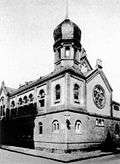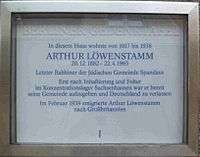Arthur Löwenstamm
| Rabbi Dr Arthur Löwenstamm | |
|---|---|
| Position | Rabbi |
| Synagogue | Spandau Synagogue (1917–38) |
| Personal details | |
| Birth name | Arthur Löwenstamm |
| Born |
20 December 1882 Ratibor, Upper Silesia |
| Died |
22 April 1965 Manchester, England |
| Buried | Hoop Lane Jewish Cemetery in Golders Green, London |
| Nationality | German until 1939; British |
| Denomination | Reform Judaism |
| Parents | Natan Löwenstamm and Johanna Zweig |
| Spouse | Gertrud Modlinger |
| Children | Erika Reid and Gerda Weleminsky |
| Occupation | Theologian, writer and rabbi |
Rabbi Dr Arthur Löwenstamm (also spelt Loewenstamm) (20 December 1882 in Ratibor, Upper Silesia – 22 April 1965 in Manchester, England) was a Jewish theologian, writer and rabbi in Berlin and in London, where he came in 1939 as a refugee from Germany.
He was the last rabbi of the Jewish community of Spandau, Germany, which comprised 600 members in 1933.[1]
Early life
Arthur Löwenstamm was born on 20 December 1882 in Ratibor, Upper Silesia,[2] which is now Racibórz in southern Poland. His parents were Natan Löwenstamm, a shopkeeper, and his wife Johanna Zweig.
Career
Löwenstamm trained at the Jewish Theological Seminary of Breslau[3] (now Wrocław in western Poland). After passing his rabbinical examinations in 1910 he worked until 1916 in Pless (now Pszczyna) in Upper Silesia. On 6 December 1916 he became Spandau Synagogue's first permanent rabbi. Löwenstamm took up his duties on 1 April 1917 and continued until the autumn of 1938. In this role he also gave religious instruction at Spandau's Kant-Gymnasium. He was a member of the Union of Liberal Rabbis in Germany.

On 9 November 1938 (Kristallnacht) the synagogue, on Lindenufer in Spandau's Old Town, was set on fire.[4][nb 1] Löwenstamm was tortured, imprisoned and deported to the Sachsenhausen concentration camp,[5] from which he was eventually released. After his release from Sachsenhausen, he found refuge in the United Kingdom in February 1939[6] but was interned for several weeks as an "enemy alien".[7]
After the war, Löwenstamm gave private lessons to several students, including Jakob Josef Petuchowski[8] and Hugo Gryn.[9] From May 1945, he was Research Director at the Society for Jewish Studies[2] and a member of the Association of Rabbis from Germany to London.
Personal life
He and his wife Gertrud (née Modlinger; born 14 February 1887, died 3 January 1952)[2] had two daughters, Erika who moved to London in 1936 and Gerda who emigrated to Britain in 1938.[7][10] His grandchildren live in Britain and in Israel.
Death and legacy


He died in Morris Feinmann House, Manchester[1] on 22 April 1965 and was buried at Hoop Lane Jewish Cemetery in Golders Green, London. His archives were donated to the Leo Baeck Institute in New York[7] and to the Wiener Library in London.
At the initiative of the Spandau Borough Council, a memorial tablet was unveiled in 1988 on the site of the former synagogue.[11] A memorial plaque was placed on the pavement, in front of Löwenstamm's former home at Feldstraße 11, in Spandau, on 9 November 2005.
On 15 August 2002 a street in Spandau was named Löwenstamm Street.[12]
Publications
Löwenstamm was a Biblical scholar, specialising in Samaritan and Karaite literature.[9] He wrote commentaries on Dutch philosopher and jurist Hugo Grotius and the German philosopher Hermann Lotze:
- Lotzes Lehre vom Ding an Sich und Ich an sich, H. Fleischmann Verlag, 1906; Republished by Nabu Press: Charleston, South Carolina, 2010; paperback, 60 pages. ISBN 978-1-147-34747-0
- "Hugo Grotius’ Stellung zum Judentum (Hugo Grotius's attitude toward Judaism)" in Festschrift zum 75-iahrigen Bestehen des Judisch-Theologischen Seminars, Vol. II (Breslau, 1929) p. 295
- "Jüdischer Lebinsstil", Gemeindeblatt für die jüdischen Gemeinden Preussens: Verwaltungsblatt der Preussischen Landesverbandes jüdischer Gemeinden, 1 November 1934 (cited on page 229 in Rebecca Rovit: The Jewish Kulturbund Theatre Company in Nazi Berlin), University of Iowa Press, 2012. ISBN 978-1-60938-124-0
He also co-wrote a history commemorating 50 years of B'nai B'rith in Germany:[13]
- Alfred Goldschmidt, Arthur Löwenstamm and Paul Rosenfeld: Zum 50 jährigen bestehen des Ordens Bne Briss in Deutschland: UOBB. Frankfurt am Main: Kauffmann, 1933.
Further reading
- Ernst Gottfried Lowenthal (1982). Juden in Preussen. Ein biographisches Verzeichnis. (Jews in Prussia. A biographical directory.) Dietrich Riemer Verlag, Berlin, p. 143. ISBN 3-496-01012-6.
- Carsten Wilke and Katrin Nele Jansen (2009). Die Rabbiner im Deutschen Reich 1871–1945 (The rabbis of the German Reich 1871–1945), K. G. Saur Verlag. ISBN 978-3-598-24874-0.
See also
Notes
- ↑ Frederic Zeller (1924–1994), who was then a Jewish teenager in Spandau, gives an eyewitness account of the burning of the synagogue in his memoir, in which he also recalls (pp 137–138, 142 and 155) Rabbi Löwenstamm.
Frederic Zeller (1989). When Time Ran Out: Coming of Age in the Third Reich. London: W H Allen. pp. 188–189. ISBN 0-491-03614-0.
References
- 1 2 "News from Germany: Spandau memorial tablet" (PDF). AJR Information. Association of Jewish Refugees. 32 (4): 5. April 1977.
- 1 2 3 Jon Epstein and David Jacobs (2006). A History in our Time: Rabbis and Teachers Buried at Hoop Lane Cemetery. Movement for Reform Judaism. p. 19.
- ↑ Jacob Petuchowski; edited by Elizabeth R Petuchowski and Aaron M Petuchowski (1998). Studies in modern theology and prayer. Philadelphia: Jewish Publication Society. p. xiiii. ISBN 0-8276-0577-3.
- ↑ Alois Kaulen and Joachim Pohl (1988). Juden in Spandau vom Mittelalter bis 1945 [Jews in Spandau from the Middle Ages until 1945]. Edition Hentrich Berlin. pp. 108–109.
- ↑ Astrid Zajdband (2014). "German Rabbis in British Exile and their influence on Judaism in Britain" (PDF). Doctoral thesis. University of Sussex. p. 51. Retrieved 2 November 2015.
- ↑ Alois Kaulen and Joachim Pohl (1988). Juden in Spandau vom Mittelalter bis 1945 [Jews in Spandau from the Middle Ages until 1945]. Edition Hentrich Berlin. p. 167.
- 1 2 3 Cord Hasselblatt (with additional material by Mone Kraft) (4 July 2006). "The life of Dr Arthur Löwenstamm". Evangelische Kirche in Spandau. Retrieved 1 April 2013.
- ↑ Hans Herman Henrix, "Jakob J Petuchowski (1925–1991): Rabbi, Scholar, Ecumenist" in: Albert Gerhards and Clemens Leonhard (editors), Jewish and Christian Liturgy and Worship: New Insights Into Its History and Interaction (2007), p. 8, Brill, Leiden; Boston, ISBN 978-90-04-16201-3
- 1 2 Hugo Gryn; Michael Shire (editor) (2012). "A Timeless Teacher, Leo Baeck (London) Lodge, B'nai B'rith London Symposium, B'nai B'rith Hillel House London, 30 May 1973". European Judaism. Berghahn Books. 45 (1).
- ↑ Werner Röder; Herbert A. Strauss (editors) (1980). International Biographical Directory of Central European Emigres 1933–1945. Band 1: Politik, Wirtschaft, Öffentliches Leben. Munich and New York City: K G Saur. p. 455.
- ↑ Arthur Löwenstamm, Retrieved 1 April 2013
- ↑ "Lṏwenstamm Street". Berlin street directory. Kauperts. Retrieved 1 April 2013.
- ↑ "1933, German, Book edition: Zum 50 jährigen bestehen des Ordens Bne Briss in Deutschland: U.O.B.B. / [Alfred Goldschmidt, Arthur Löwenstamm, Paul Rosenfeld].". National Library of Australia. Retrieved 12 April 2013.